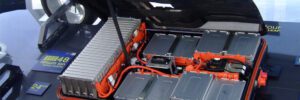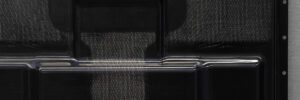
Nissan’s factory in Sunderland, England is ending production of the LEAF after 13 years—but that doesn’t mean the automaker is giving up on the UK EV market. On the contrary, Nissan is planning to build two new EVs at the plant, and is also working on a UK battery factory.
A further sign of Nissan’s commitment to electrification is a new joint project with Altilium, a UK-based clean technology group, which is aimed at improving the sustainability of UK-made EV batteries by recycling used batteries and reducing reliance on imported raw materials.
Nissan and Altilium will work together to develop a closed-loop model for battery materials—this will include processing waste from spent Nissan LEAF batteries and production scrap and upcycling these materials to produce high-nickel cathode active materials (CAM) for testing in the next generation of EV batteries.
Also cooperating on the initiative: battery producer AESC, a long-standing partner of Nissan; and Connected Energy, a UK provider of second-life battery energy storage solutions.
Altilium says its proprietary EcoCathode hydrometallurgical process can recover over 95% of cathode metals, including lithium, from end-of-life EV batteries. The recovered materials aren’t just recycled—they’re re-engineered and upcycled to high-nickel CAM. Altilium’s first mini-commercial plant is currently under construction in Plymouth. Another planned facility in Teesside will have the capacity to process scrap from over 150,000 EVs per year, producing 30,000 MT of CAM.
“The collaboration with Nissan, AESC and Connected Energy marks a significant milestone in our mission to create a sustainable ecosystem for EV batteries,” said Dr Christian Marston, co-founder and COO of Altilium. “Together, we are leveraging our strengths and resources to revolutionize how we manage and repurpose EV batteries, ensuring the UK has a domestic and sustainable source of battery materials.”
Sources: Altilium, Sunderland Echo
from Charged EVs https://ift.tt/14SRYAP


No comments:
Post a Comment